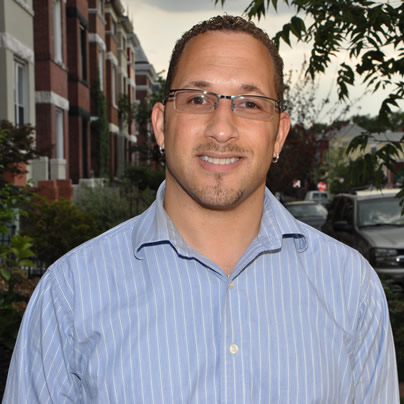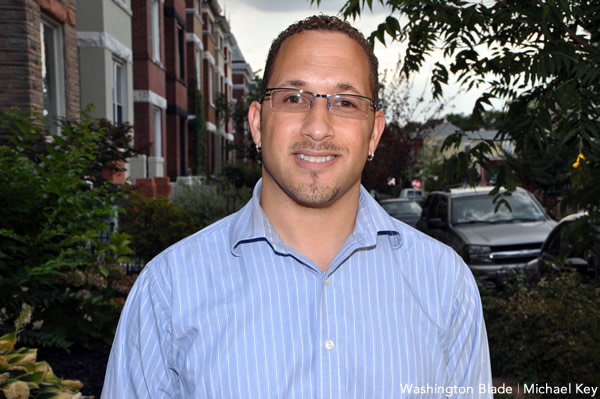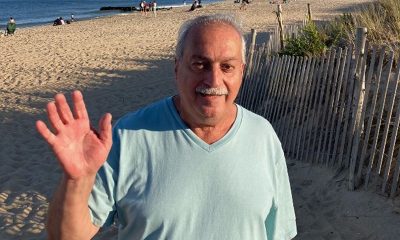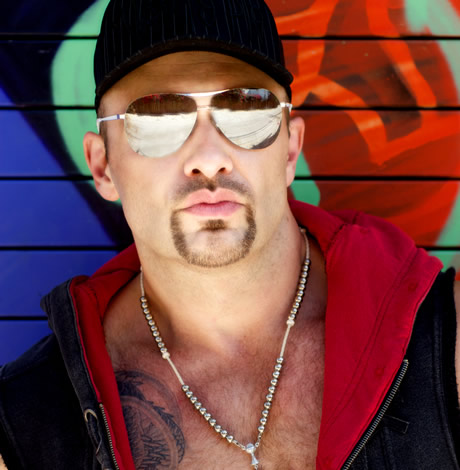Arts & Entertainment
Queery: Brian Markowski
The honors graduate answers 20 gay questions

It’s never easy to go back to school later in life, but through hard work and dedication, Brian Markowski managed to maintain a 4.0 GPA and graduate with both bachelor’s and master’s degrees in information systems through Strayer University while balancing family life with his partner and two stepchildren, Rico and Myles.
The 43-year-old Air Force vet and Middletown, Conn., native, has been in Washington since the mid-‘90s after stints in St. Louis; Biloxi, Miss.; Pensacola, Fla.; Germany and more. Markowski, known as “Ski” among friends, was honored in June at the university’s commencement ceremony for his “commitment to academic excellence and the community.” He also volunteers with the Capital Area Food Bank and My Sister’s Place.
Markowski and his partner, David Gilmer, live in D.C.’s Bloomingdale neighborhood. They’ve been together six years. Markowski enjoys dancing and spending time with family and friends in his free time. (Blade photo by Michael Key)
How long have you been out and who was the hardest person to tell?
Since 1997. It was hardest to tell my mom and dad because I did not want to be rejected. I actually had to make two separate trips to the upper East Coast to tell them. I told my mom one weekend and since my dad was not around on the first trip, I had to make a second trip to tell him. My mom and dad are not married so they do not live together.
Who’s your LGBT hero?
I would have to say Ellen DeGeneres. When Ellen came out she made her career and personal life an open window and society was waiting to throw stones. She held her own, stayed true to herself and those stones bounced right off.
What’s Washington’s best nightspot, past or present?
Tracks & Escandalo. Tracks was that club that everyone went to, gay or straight. Escandalo was one of the best gay Latin clubs. It had a family atmosphere and people were so real. It was small but would pack in the crowd and play that great music.
Describe your dream wedding.
To get married on the beach of Manatí on the island of Puerto Rico surrounded by family and friends. Once the wedding after party is done, would love to be carried away in a hot air balloon as my partner and I wave farewell.
What non-LGBT issue are you most passionate about?
Besides having affordable health care for all, we need to remember to respect others. Everyone is so pre-occupied with who is getting a divorce, having a baby, gaining or losing weight and blasting out other people’s business on Twitter, Facebook, etc. Remember all people have the right to privacy. Instead of trying to be in the mix, take a few steps back and take a good look in the mirror. The reflection you get back may surprise you.
What historical outcome would you change?
The assassinations of Martin Luther King Jr. and John F. Kennedy. Their contributions to our country’s equal rights campaign were just the beginning. They both died too soon.
What’s been the most memorable pop culture moment of your lifetime?
OMG who did not like the ‘80s: balloon pants, big hair (male and female), crazy colors. Who would have thought Madonna would become such an icon? And I will never forget watching the Motown anniversary special when Michael Jackson did the moonwalk across stage and the crowd went crazy.
On what do you insist?
I insist on staying true to yourself and always doing your best. Life is not a DVR — there are no replays.
What was your last Facebook post or Tweet?
Giving thanks to all who posted happy birthday messages to me.
If your life were a book, what would the title be?
“My name is S K I … Like going down or up a hill”
If science discovered a way to change sexual orientation, what would you do?
Nothing — I feel that being gay is what helps me stay special. It is the cherry on top of this ice cream sundae of life. Being gay is part of me but does not make me who I am as a man.
What do you believe in beyond the physical world?
I believe when your time here is done there is another place beyond where you will be with the ones you love.
What’s your advice for LGBT movement leaders?
Don’t let your position allow you to lose focus on the prize: Equality for all.
What would you walk across hot coals for?
To dance side by side or face to face with Janet Jackson.
What LGBT stereotype annoys you most?
I hate them all. The fact that we have stereotypes does not help us gain overall equality.
What’s your favorite LGBT movie?
“To Wong Foo, Thanks for Everything Julie Newmar”
What’s the most overrated social custom?
Holding the door for a lady. I think we should hold the door for the next person behind you, whether male or female. It does annoy me that when you do hold it for someone you cannot even get a thank you.
What trophy or prize do you most covet?
My outstanding graduate student award from Strayer University. I was recognized in front of all my family and friends, and thousands of others, a few weeks ago at commencement ceremony at the Verizon Center here in D.C.
What do you wish you’d known at 18?
Life is what you make it and not what you have.
Why Washington?
I moved to D.C. after a short time in North Carolina pursuing my post-military telecommunication career.

Team DC, the umbrella organization for LGBTQ-friendly sports teams and leagues in the D.C. area, held its annual Night of Champions Awards Gala on Saturday, April 20 at the Hilton National Mall. The organization gave out scholarships to area LGBTQ student athletes as well as awards to the Different Drummers, Kelly Laczko of Duplex Diner, Stacy Smith of the Edmund Burke School, Bryan Frank of Triout, JC Adams of DCG Basketball and the DC Gay Flag Football League.
(Washington Blade photos by Michael Key)




















The 2024 National Cannabis Festival was held at the Fields at RFK Stadium on April 19-20.
(Washington Blade photos by Michael Key)
















Covering the @NatlCannaFest at RFK Stadium for @WashBlade . Stop by the LGBTQ+ booth and pick up a paper if you are here. pic.twitter.com/is7hnsaPns
— Michael Patrick Key (@MichaelKeyWB) April 20, 2024
Theater
‘Amm(i)gone’ explores family, queerness, and faith
A ‘fully autobiographical’ work from out artist Adil Mansoor

‘Amm(i)gone’
Thorough May 12
Woolly Mammoth Theatre
641 D St., N.W.
$60-$70
Woollymammoth.net
“Fully and utterly autobiographical.” That’s how Adil Mansoor describes “Amm(i)gone,” his one-man work currently playing at Woolly Mammoth Theatre.
Both created and performed by out artist Mansoor, it’s his story about inviting his Pakistani mother to translate Sophocles’s Greek tragedy “Antigone” into Urdu. Throughout the journey, there’s an exploration of family, queerness, and faith,as well as references to teachings from the Quran, and audio conversations with his Muslim mother.
Mansoor, 38, grew up in the suburbs of Chicago and is now based in Pittsburgh where he’s a busy theater maker. He’s also the founding member of Pittsburgh’s Hatch Arts Collective and the former artistic director of Dreams of Hope, an LGBTQ youth arts organization.
WASHINGTON BLADE: What spurred you to create “Amm(i)gone”?
ADIL MANSOOR: I was reading a translation of “Antigone” a few years back and found myself emotionally overwhelmed. A Theban princess buries her brother knowing it will cost her, her own life. It’s about a person for whom all aspirations are in the afterlife. And what does that do to the living when all of your hopes and dreams have to be reserved for the afterlife?
I found grant funding to pay my mom to do the translation. I wanted to engage in learning. I wanted to share theater but especially this ancient tragedy. My mother appreciated the characters were struggling between loving one another and their beliefs.
BLADE: Are you more director than actor?
MANSOOR: I’m primarily a director with an MFA in directing from Carnegie Mellon. I wrote, directed, and performed in this show, and had been working on it for four years. I’ve done different versions including Zoom. Woolly’s is a new production with the same team who’ve been involved since the beginning.
I love solo performance. I’ve produced and now teach solo performance and believe in its power. And I definitely lean toward “performance” and I haven’t “acted” since I was in college. I feel good on stage. I was a tour guide and do a lot of public speaking. I enjoy the attention.
BLADE: Describe your mom.
MANSOOR: My mom is a wonderfully devout Muslim, single mother, social worker who discovered my queerness on Google. And she prays for me.
She and I are similar, the way we look at things, the way we laugh. But different too. And those are among the questions I ask in this show. Our relationship is both beautiful and complicated.
BLADE: So, you weren’t exactly hiding your sexuality?
MANSOOR: In my mid-20s, I took time to talk with friends about our being queer with relation to our careers. My sexuality is essential to the work. As the artistic director at Dreams of Hope, part of the work was to model what it means to be public. If I’m in a room with queer and trans teenagers, part of what I’m doing is modeling queer adulthood. The way they see me in the world is part of what I’m putting out there. And I want that to be expansive and full.
So much of my work involves fundraising and being a face in schools. Being out is about making safe space for queer young folks.
BLADE: Have you encountered much Islamophobia?
MANSOOR: When 9/11 happened, I was a sophomore in high school, so yes. I faced a lot then and now. I’ve been egged on the street in the last four months. I see it in the classroom. It shows up in all sorts of ways.
BLADE: What prompted you to lead your creative life in Pittsburgh?
MANSOOR: I’ve been here for 14 years. I breathe with ease in Pittsburgh. The hills and the valleys and the rust of the city do something to me. It’s beautiful, it’ affordable, and there is support for local artists. There’s a lot of opportunity.
Still, the plan was to move to New York in September of 2020 but that was cancelled. Then the pandemic showed me that I could live in Pittsburgh and still have a nationally viable career.
BLADE: What are you trying to achieve with “Amm(i)gone”?
MANSOOR: What I’m sharing in the show is so very specific but I hear people from other backgrounds say I totally see my mom in that. My partner is Catholic and we share so much in relation to this.
I hope the work is embracing the fullness of queerness and how means so many things. And I hope the show makes audiences want to call their parents or squeeze their partners.



















